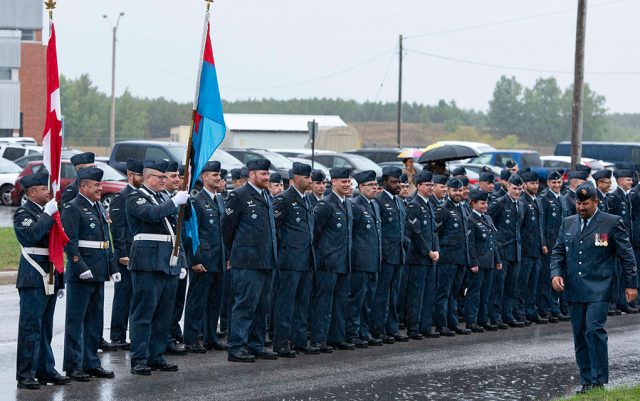
From July to October 1940, more than 100 Canadians flew in the Battle of Britain alongside Britain and many allies. It was the first time in Canadian history that Canada’s own identifiable air assets participated in fighting missions. 23 Canadians lost their lives during the battle. Each year, the Royal Canadian Air Force (RCAF) honours their sacrifice, and recognizes the courage and selflessness that helped enable the allied forces to achieve a historic victory.
On one of the rainiest days of the year, the 79th annual Battle of Britain Parade was held in front of the RCAF Cenotaph on Maple Leaf Drive, at CFB Borden – hosted by 16 Wing. In attendance, with 16 Wing members on parade, included CFB Borden Base Commander, Col Atherton and Base CWO, CPO 1 Campbell, local dignitaries, CAF veterans, members of 441 Squadron, RCAF association, members of the local legion, air cadets and members of the public.
As the rain continued unabated, Col Pascal Godbout, Commander of 16 Wing and the Reviewing Officer of the parade, welcomed guests to the 79th anniversary of the Battle of Britain. Col Godbout asked that those in attendance to acknowledge the veterans that joined them this day – some of which were on parade. He concluded by paying respect to those who lost their lives in service, and to those veterans who have passed recently, including Squadron Leader, John Hart DFC, the last surviving Canadian-born Battle of Britain pilot.
The Battle of Britain is widely recognized as one of the greatest air battles of all time, and is considered to be one of the turning points of the Second World War. It was fought between July 10 and October 31, 1940, over the southern part of England and the English Channel. It was during this battle that a small group of fighter pilots from the commonwealth and allied countries turned the tide on Hitler’s plan for an invasion of Great Britain. Throughout that period, more than 400 brave Canadian pilots, aircrew and ground crew, served with various units of the Royal Air Force and the RCAF. The Battle of Britain is especially significant for Canada’s Air Force heritage since it was during that battle that the RCAF received its baptism by fire. Of the more than 100 Canadian pilots who flew in the Battle of Britain, 23 lost their lives in battle, and, of the remainder who fought in later campaigns, 35 never made it home.
The Battle of Britain is celebrated on the third Sunday of September to commemorate the point in the battle when Fighter Command delivered such a punishing blow to the Luftwaffe – a warfare branch of the combined German military forces – that Hitler decided to postpone indefinitely his planned invasion of Great Britain. The crucial outcome of this confrontation was immortalized by Sir Winston Churchill when he stated, “never in the field of human conflict was so much owed by so many to so few.”
De juillet à octobre 1940, plus de 100 Canadiens ont combattu aux côtés de la Grande-Bretagne et de nombreux alliés lors de la bataille d’Angleterre. Pour la première fois de son histoire, le Canada déployait ses propres ressources aériennes identifiables pour participer à des missions de combat. Vingt-trois Canadiens ont perdu la vie au cours de la bataille. Chaque année, l’ARC commémore le sacrifice de ces hommes, ainsi que le courage et l’abnégation qui ont permis aux Forces alliées de remporter une victoire historique.
Pendant l’une des journées les plus pluvieuses de l’année, le 79e défilé de la bataille d’Angleterre a eu lieu devant le cénotaphe de l’ARC situé sur la promenade Maple Leaf, à la BFC Borden, en Ontario. Parmi les représentants présents au défilé de la 16e Escadre, mentionnons le Col A. Atherton, commandant de la BFC Borden, et le PM 1 D.E. Campbell, adjudant-chef de la base, de même que des dignitaires locaux, d’anciens combattants des FAC, des membres de l’Association de l’ARC (441e Escadron), des membres de la Légion, des cadets de l’Air et des membres du public.
Sous une pluie incessante, le Col Pascal Godbout, commandant de la 16e Escadre et officier de la revue, a souhaité la bienvenue à tous au défilé commémoratif du 79e anniversaire de la bataille d’Angleterre. Le Col Godbout a demandé à la foule de saluer les anciens combattants présents, dont certains participaient au défilé. Il a conclu en rendant hommage à ceux qui ont perdu la vie en service, ainsi qu’aux anciens combattants qui sont décédés récemment, y compris le commandant d’aviation John Hart, DFC, dernier pilote canadien vivant ayant participé à la bataille d’Angleterre.
La bataille d’Angleterre est largement reconnue comme l’une des plus grandes batailles aériennes et comme l’un des moments décisifs de la Seconde Guerre mondiale. Elle a eu lieu du 10 juillet au 31 octobre 1940, au-dessus du sud de l’Angleterre et de la Manche. Au cours de cette bataille, un groupe relativement petit de pilotes de chasse du Commonwealth et des pays alliés a permis de contrer le plan d’Hitler concernant l’invasion de la Grande-Bretagne. Durant cette période, plus de 400 braves pilotes, membres d’équipage et membres d’équipage au sol canadiens ont servi dans différentes unités de la Royal Air Force et de l’Aviation royale du Canada. La bataille d’Angleterre revêt une importance particulière pour le patrimoine de la Force aérienne du Canada. En effet, c’est au cours de cette bataille que l’Aviation royale du Canada a eu droit à son baptême par le feu. Des 100 pilotes canadiens et plus qui ont participé à la bataille d’Angleterre, 23 y ont perdu la vie; 35 Canadiens ne sont jamais rentrés au pays au cours des campagnes ultérieures.
La bataille d’Angleterre est célébrée le troisième dimanche de septembre de chaque année pour commémorer ce moment décisif dans la bataille où le Fighter Command a infligé un coup si brutal à la Luftwaffe qu’Hitler décida de reporter indéfiniment l’invasion prévue de la Grande-Bretagne. Le résultat crucial de cette confrontation a été immortalisé par Sir Winston Churchill lorsqu’il a affirmé que « jamais, dans l’histoire des guerres, tant d’hommes n’ont dû autant à si peu d’hommes ».
By/Par: MWO Doug Hennessey











